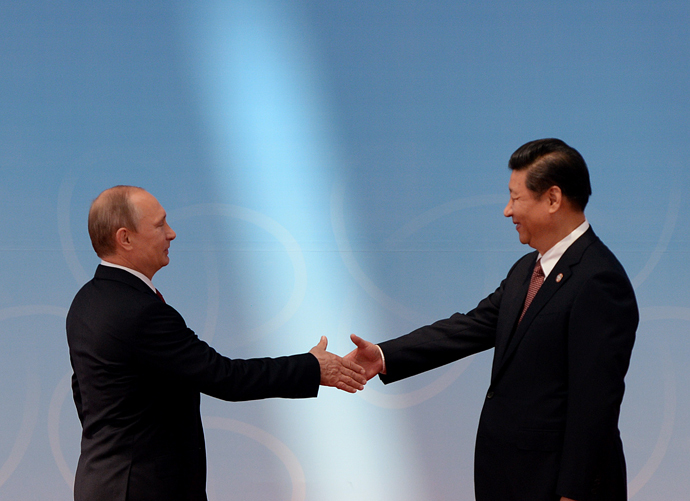
http://rt.com/business/202975-putin-china-apec-tpp/
The US-proposed Trans-Pacific Partnership (TPP) won’t be able to promote effective trade and economic cooperation if it excludes key regional players, like Russia and China, Russian President said ahead of his visit to Beijing for 25th APEC summit.
FULL INTERVIEW: US seeks to create economic cooperation for its own benefit – Putin on TPP
“Obviously, the Trans-Pacific Partnership is just another US attempt to build an architecture of regional economic cooperation that the US would benefit from,” the Russian President said in an interview with Chinese media. “At the same time, I believe that the absence of two major regional players such as Russia and China in its composition will not promote the establishment of effective trade and economic cooperation.”
The TPP is a proposed regional free-trade agreement, which is being negotiated by 12 states in the Asia-Pacific region, which include the US, Australia, Brunei Darussalam, Canada, Chile, Japan, Malaysia, Mexico, New Zealand, Peru, Singapore and Vietnam.
It was planned that the talks to launch the Partnership would be completed between 2005 and 2012, but complex issues like agriculture, intellectual property, investments and others saw the discussion continue until now.
Yet, President Putin stressed, it is not easy to evaluate the progress, which has been achieved in the talks on Trans-Pacific Partnership.
“This initiative is carried out behind closed doors, even businesses and the public of the contracting states have no access to it, let alone other countries. Over the past five years of negotiations, we have repeatedly heard about the success achieved, but such statements have always been refuted later,” he said.

Many experts view the TPP as Washington’s attempt to counter APEC (Asia-Pacific Economic Cooperation) amid growing influence of Russia and China in the region.
Launched back in1989, the APEC is a forum of 21 Pacific Rim states aimed at promoting free trade and economic cooperation throughout the Asia-Pacific region.
The Russian president acknowledged that organization of different regional free trade agreements is currently “one of the global trends.”
However, he stressed that the free trade agreements “shouldn’t fragment the multilateral trading system, but rather complement it, contribute to its consolidation and growth of interconnectedness.”
“The regional unions should not be turned against each other or otherwise divided. Such agreements should be transparent, fair and address the needs of each economy. Regional integration should be transparent and promote information-sharing between all the negotiations processes,” the head of the Russian state explained.
According to Putin, those are the principles, strictly followed in the implementation of Russia “priority integration project,” the Eurasian Economic Union (EEU), a political and economic union between Russia, Belarus, Kazakhstan and Armenia that will go into effect on 1 January 2015.

“Values and principles of this association’s activities are transparent and carried out in full compliance with the rules and regulations of the World Trade Organization,” the President said.
The annual 25th APEC summit will take place in Chinese capital, Beijing, on November 10-11, with the likes of Chinese President Xi Jinping, US President Barack Obama, Russian President Vladimir Putin and Japanese Prime Minister Shinzo Abe among the attendees.
As for relations between Moscow and Beijing, the Russian president reiterated that “strengthening ties with the People’s Republic of China is a foreign policy priority of Russia.”
“Today, our relations have reached the highest level of comprehensive equitable trust-based partnership and strategic interaction in their entire history,” he said.
Moscow made a pivot towards Beijing after the US and EU imposed sanctions on Russia over the events in Ukraine earlier this year. In May, the two countries signed a $400 billion deal to construct the Power of Siberia pipeline, which will deliver 4 trillion cubic meters of gas to China over 30 years.
Overall trade between Russia and China increased by 3.4 per cent in the first half of 2014, reaching $59.1 billion. The central banks of the two countries recently have signed a three-year ruble-yuan currency swap deal up to $25 billion, in order to boost trade using national currencies and lessen dependence on the dollar and euro.

Mr. Putin with capitalism there are winners and losers not win-win. Marx knew what he was talking about and your economic advisor knows this as well. Have you forgotten the USSR did not fall it was pushed.
RR
Seems, a great bunch of spectators still take the inhuman capitalistic Talmut-based rule, of “the Winner takes it all”! for granted – in Eternity. Only stupids refer to humans as Poker-Gamblers. We prefer Chess & Go!